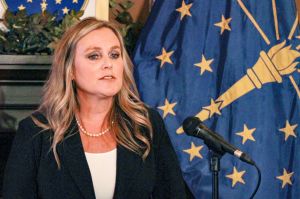
Rep. Victoria Garcia Wilburn, D-Fishers, poses with her son outside the Indiana Statehouse. (Photo provided by Garcia Wilburn)
Thousands of lawmakers have cycled through the Indiana General Assembly in the last two centuries, but only a fraction have been women — and even fewer among them, moms.
More Hoosier women are serving in public office than ever before, bringing with them an important perspective to writing laws and governing.
But barriers remain for women — and moms, especially — to make it into the Statehouse. Current legislators said, too, that balancing a public and private life can also be more challenging than for their male counterparts.
“Being a state representative or state senator, for young parents, is difficult. And I think it may be a barrier to why many younger people, and moms, don’t run for these offices,” said Rep. Ragen Hatcher, D-Gary. “There are some things that the legislature can do to accommodate people better with younger children, and I just hope that we start doing that instead of leaving that age group out — those who may have the younger children but don’t want to necessarily have to leave them at home.”
A history of Hoosier women at the capital
Julia Nelson, a Republican from Muncie, was Indiana’s first woman to serve in the legislature. A long-time suffragette, she was 56 years old when she earned her spot in 1920.
She served a full term from 1921-1923. Her first speech called for the care and support of poor parents by their children.

Since Nelson’s service, there has been at least one woman in every session of the Indiana General Assembly, according to Capitol and Washington political blog. Progress was slow, though. Nelson was replaced in 1922 by Elizabeth Rainey, a Republican from Marion County, who also served just a single term. She was followed by two more women in the House in 1924, another two in 1926, and three in 1928.
It wasn’t until the onset of World War II — when many men went off to war — that women’s numbers grew in the General Assembly. And it wasn’t until 1964 that a woman was elected to serve in both chambers.
At the close of the most recent 2024 legislative session, there were 40 women — 31 in the Indiana House and nine in the Indiana Senate — serving among the 150 elected assembly members. That’s equal to 26.7% of all state legislators. Seventeen of the women are Democrats, and 23 are Republicans.
Woman make up 50% of the state population.
Sen. Jean Breaux, D-Indianapolis, died in March, however. Rep. Donna Schaibley, R-Carmel, additionally announced her plans to retire after the 2024 session. Rep. Sharon Negele, R-Attica, also won’t return to the Statehouse after she lost the GOP nomination for her District 13 seat in Tuesday’s primary election.
It’s up to voters to decide this November who will next fill those seats.
Currently, Indiana ranks 40th in the nation for its percentage of women officeholders in the legislature, according to the Center for American Women and Politics.
Getting elected — and getting to work
When Hatcher was first elected to the House six years ago, she had three high schoolers, along with a four- and six-year-old. Not wanting to leave her kids in Gary during the legislative session, she instead opted to bring all five with her to Indianapolis.

“Between going to and being at the Statehouse, I was dropping off and picking up kids from school,” she said. Her family later bought a house in the capital city “so they would have a solid place to live.”
“My younger two, they knew everyone in the Statehouse by the time that first year was up,” Hatcher continued. “But if it weren’t for my mom, and my sisters, and just my family overall, I could not have done it without them. There was no way. You have to have a support system when you have little kids.”
Democratic Rep. Victoria Garcia Wilburn, of Fishers, also said she “wouldn’t have had the opportunity to be in the Statehouse” without support from her family. Elected to the House in 2022, the mom of three school-aged kids recalled her youngest, then eight years old, joining her on the campaign trail at fundraisers and helping knock on doors.
“I remember voters saying, ‘If you did this good of a job with your son, I can imagine how you’ll do such a great job for our district,’” she said. “I have two daughters and a son, and I see their faces a lot in the different pieces of legislation that are brought up, and so because of that, I do feel as if I’m a fierce advocate for families.”
She pointed to legislation she championed during the 2024 session that requires child care centers and preschools to test their drinking water for lead and take action if the toxin is found.

“I thought to myself, my goodness, if my children were drinking toxic water at preschool, that would have been devastating for them. That positions my heart a little bit differently than somebody that maybe wasn’t so intimately involved in child rearing,” Garcia Wilburn said. “I think as a mother, in particular, everybody wants mom. They want mom when they’re hurting. They want mom when they’ve got good news coming through. They want mom’s advice. And so, as a mother, I see myself often championing pieces of legislation to keep our children safe.”
Two of her children are special ability learners — one has a visual processing disorder, another has an auditory processing disorder — which Garcia Wilburn said also leads her to “always think about how pieces of legislation impact education,” especially those with individualized education program (IEPs) or other special education plans.
Although her children are older now, Sen. Liz Brown, R-Fort Wayne, said being a parent “certainly makes me thoughtful, in terms of issues with respect to raising children.” Over her last decade in the senate, that’s included a special focus on Indiana’s Department of Child Services, maternal health issues, and expanding Medicaid up to a year for new moms.
“I have seven children, and they all have varying opinions on a whole lot of issues, and I respect them and appreciate that,” Brown said. “I appreciate their concerns and listen to them. I think it informs my opinions.”
School-related legislation that increases parents’ “access to information” and bills to increase consumer privacy have also been among her recent priorities.
“I definitely bounce discussions off of (my kids) on these things. I also seek out other people — it’s not as if they’re expert sources — but I think it’s a great perspective to have someone who’s younger,” Brown said. “How is the world affecting them? How did these things affect them, and just what’s their perspective on things?”
Helping other moms — and getting more in the Statehouse
A mom among the House Republicans, Rep. Julie McGuire, R-Indianapolis, has two adult daughters and two sons aged 17 and 18.
She said her experiences raising kids has notably made her “passionate about school choice.”

“For my own kids, my children have been the benefit of school choice. We’ve done public, private and charter schools. So for me, I’m passionate about that,” said McGuire, who spent 15 years working for St. Roch Catholic School, where her kids attended, before she was elected in 2022. U.S. Sen. Mike Braun this week put forth McGuire as his lieutenant governor running mate for the 2024 general election, following his primary victory.
In the most recent session, McGuire additionally spent multiple months on legislation that focused on adoption and foster care reforms: “As a mom, I’m just passionate for these kids and trying to give them some stability in the safest way possible,” she said.
Still, she acknowledged that having older kids puts her “in a unique,” less challenging position compared to moms of younger children.
“If you’re called to do this, if you have a passion for this, I feel like if there’s a will, there’s a way — I think that you can make your schedule work. And I encourage women to get involved and to find that balance and to find that right position,” she said. “Maybe it’s not running for state rep right now, but maybe it’s getting involved in your local club, starting there, building those relationships with that flexibility. Maybe it’s looking at the school board or county commissioner, whatever it may be in your area. But I think that’s a good way to start dipping your toes in and being part of your party.”

Sen. Shelli Yoder, D-Bloomington, on the other hand, had young children — between the ages of two and six — when she first decided to run for office. Although her kids are older now, Yoder said motherhood has made her keenly aware of the need to focus on legislation specifically affecting women, along with broader bills that will improve the livelihoods of all Hoosiers — moms included.
“The notion that legislation that is centered on motherhood is just about motherhood itself is misguided when it comes to wages and incomes,” Yoder said. “We know that in Indiana, women earn less than men. So every time we can bring up those incomes for women, and opportunities for people to have better access to good paying jobs, that impacts motherhood.”
Yoder additionally leads an ongoing effort to eliminate taxes on menstruation products. So far, such legislation has failed to advance in the legislature.
“My male colleagues said they appreciated my efforts, but they just don’t see how it makes that big of a difference at the end of the day, in the pocketbook. But let me tell you, every woman I talked to says this makes a difference. So why won’t we do it?” she asked.
Like Yoder, access to affordable, quality child care is also high on Hatcher’s agenda. Free preschool is a large part of the conversations they’re pushing, as well.
In Indiana, neither preschool or kindergarten are required. Having put her own kids through early education, Hatcher said she saw firsthand how better access to schooling can help Indiana’s dismal literacy scores, for example.
“When my kids come into a classroom in first grade where students have no previous training at all — no alphabets, numbers, anything like that — then that pulls back the entire class. So one of the biggest things that we’ve been pushing is that kindergarten has to be mandatory,” Hatcher said. “But preschool should also be available to every student starting at age three. If we would just fund preschool for every kid in the state, then we would catch (learning deficiencies) on the front end and not have to hold kids back in the third grade.”
Both women said increased child care, including for lawmakers, would further help accommodate more moms to seek seats in the legislature. They emphasized that getting those initiatives across the finish line is complicated by a male-dominated Republican supermajority, though.
“Free school makes a huge difference for people like me who wanted to come down and who might not have that support system in place,” Hatcher said. “These social issues become important to Republicans when it happens to them or someone in their family. They almost have to touch it directly or feel it directly before they’re ready to make legislative changes. And so that makes it harder for them to even understand … or for them to want to step up and take real notice.”
Capital Chronicle editor Niki Kelly and reporter Leslie Bonilla Muñiz contributed reporting.











